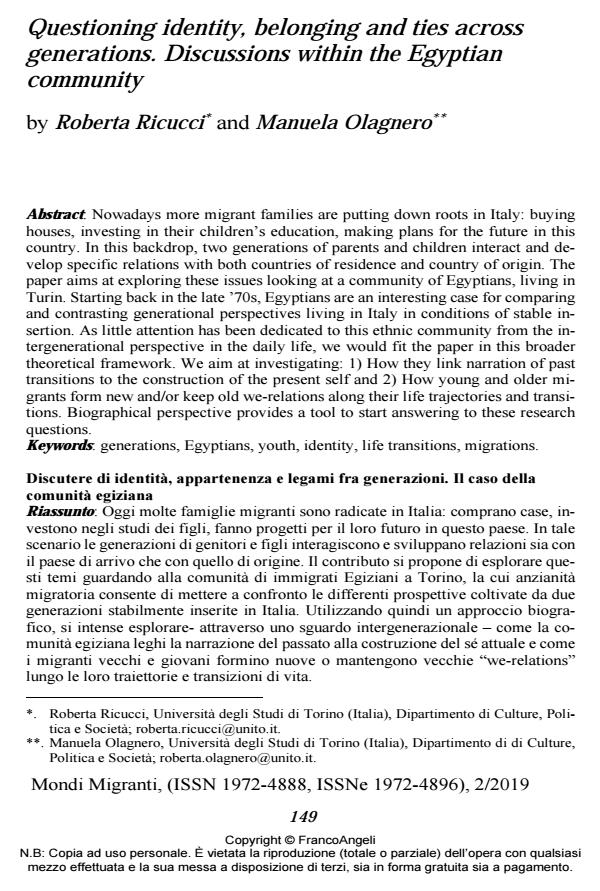Questioning identity, belonging and ties across generations. Discussions within the Egyptian community
Titolo Rivista MONDI MIGRANTI
Autori/Curatori Roberta Ricucci, Manuela Olagnero
Anno di pubblicazione 2019 Fascicolo 2019/2
Lingua Inglese Numero pagine 21 P. 149-169 Dimensione file 254 KB
DOI 10.3280/MM2019-002008
Il DOI è il codice a barre della proprietà intellettuale: per saperne di più
clicca qui
Qui sotto puoi vedere in anteprima la prima pagina di questo articolo.
Se questo articolo ti interessa, lo puoi acquistare (e scaricare in formato pdf) seguendo le facili indicazioni per acquistare il download credit. Acquista Download Credits per scaricare questo Articolo in formato PDF

FrancoAngeli è membro della Publishers International Linking Association, Inc (PILA), associazione indipendente e non profit per facilitare (attraverso i servizi tecnologici implementati da CrossRef.org) l’accesso degli studiosi ai contenuti digitali nelle pubblicazioni professionali e scientifiche.
Nowadays more migrant families are putting down roots in Italy: buying houses, investing in their children’s education, making plans for the future in this country. In this backdrop, two generations of parents and children interact and develop specific relations with both countries of residence and country of origin. The paper aims at exploring these issues looking at a community of Egyptians, living in Turin. Starting back in the late ’70s, Egyptians are an interesting case for comparing and contrasting generational perspectives living in Italy in conditions of stable inser-tion. As little attention has been dedicated to this ethnic community from the in-tergenerational perspective in the daily life, we would fit the paper in this broader theoretical framework. We aim at investigating: 1) How they link narration of past transitions to the construction of the present self and 2) How young and older mi-grants form new and/or keep old we-relations along their life trajectories and tran-sitions. Biographical perspective provides a tool to start answering to these re-search questions.
Oggi molte famiglie migranti sono radicate in Italia: comprano case, investono ne-gli studi dei figli, fanno progetti per il loro futuro in questo paese. In tale scenario le generazioni di genitori e figli interagiscono e sviluppano relazioni sia con il paese di arrivo che con quello di origine. Il contributo si propone di esplorare questi temi guardando alla comunità di immigrati Egiziani a Torino, la cui anzianità migrato-ria consente di mettere a confronto le differenti prospettive coltivate da due gene-razioni stabilmente inserite in Italia. Utilizzando quindi un approccio biografico, si intense esplorare- attraverso uno sguardo intergenerazionale - come la comunità egiziana leghi la narrazione del passato alla costruzione del sé attuale e come i mi-granti vecchi e giovani formino nuove o mantengono vecchie "we-relations" lungo le loro traiettorie e transizioni di vita.
Parole chiave:Generazioni, egiziani, giovani, identità, transizioni di vita, migrazioni.
- Migrants' descendants in Italy: experiences and representations in the research. A literature review Stefano Allievi, Sveva Magaraggia, Daniela Cherubini, Andrea Calabretta, Alessandra Turchetti, Enrico Maria La Forgia, in MONDI MIGRANTI 3/2025 pp.166
DOI: 10.3280/MM2025-003008
Roberta Ricucci, Manuela Olagnero, Questioning identity, belonging and ties across generations. Discussions within the Egyptian community in "MONDI MIGRANTI" 2/2019, pp 149-169, DOI: 10.3280/MM2019-002008